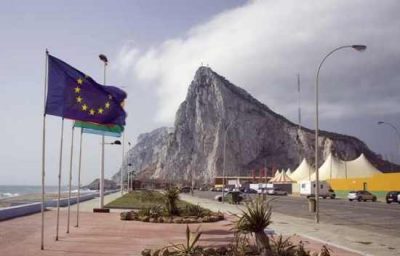By
Tom Arms
Gibraltarians are happy people. They should be. The Rock is the second most prosperous territory in the EU. The economy is growing at an astonishing ten percent a year and has been for some time. Unemployment is less than half of one percent.
Its location on the tip of Southern Spain provides it with a balmy climate and British and EU law protect it from economic storms. They even have a tribe of Barbary apes to play with at the 1500 foot peak of their iconic limestone rock.
Gibraltarians are also a worried people. For on June the 23rd their idyllic life could quickly start to unravel.
That is the date that Britain votes on whether to leave or remain in the European Union. As a British dependent territory on European soil, Gibraltar’s 30,000 citizens have to go the way the 47.4 million registered voters back in Blighty swing. At the moment all bets on the final result are off as the Remain and Leave campaigns charge neck and neck in an emotionally-charged race to the polling stations.
But in Gibraltar 88.3 percent of the residents are behind remaining in the EU according to a Gibraltar Chronicle poll. Their prosperity—their very existence—depends on it.
Over the past 30 years they have become a world centre for financial services, online gambling and tourism. The first two rely largely on Gibraltar’s unfettered access to European markets and have created the cash to transform Gibraltar into an immaculately clean colonial town which attracts more than 200 cruise ships a year and something like 10 million tourists. It has the highest tourist to resident ratio in the world.
But hanging over this prosperity is the looming shadow of Spain and a 303-year-old dispute over the sovereignty of the Rock. The Spanish lost control of Gibraltar in 1713 with the Treaty of Utrecht which ended the Spanish war of Succession. The British had had their eye on the gateway to the Mediterranean since 1655. During the war from 1701 to 1714 it sided with Holland, Germany, and Austria against losers France and Spain. It seized Gibraltar in 1703 and when the war ended the Brits would not be moved.
The Treaty of Utrecht is a black mark in Spanish history. It was as humiliating to the Spaniards as the 1919 Treaty of Versailles was to the Germans. The ink had hardly dried before the Spanish were repudiating Utrecht and demanding British withdrawal. In 1727 they laid siege to the British garrison. It failed. Then when the British were distracted by a small war in America from 1776 to 1783 the Spanish imposed “The Great Siege.” The garrison again held firm.
During the 19th century the Spanish claim fell dormant as the British empire soared to its zenith and theirs sunk into oblivion. Then along came Generalissimo Francisco Franco, the fascist dictator with an uncanny ability to pluck the heartstrings of Spanish nationalism. In 1954 he closed the border and it stayed sealed until 1985. It was forced open as part of the deal for Spanish accession to the European Community.
But the Spanish claim lurks off stage. Spain, in the eyes of Gibraltarians, is the country where fascists ruled 40 years ago. It is politically unstable, riven by territorial factions and suffering an unemployment of 25 percent-plus. They don’t want any part of it and the British have promised that they will not turn over the Rock to Madrid without their say-so. It is called self-determination and the firmly held principle was used to send troops to the South Atlantic to protect the Falkland Islands.
The Spaniards only opened the border because EU law dictated that club members had to be friends. If Britain leaves the European club Anglo-Spanish friendship is out the window. In fact, it is clear that Spanish foreign minister Jose Garcia Margallo does not suffer from anglophilia. Last year he ordered an end to Spanish language classes in the British colony stating that there was no need for them in Gibraltar “as everyone speaks Spanish except the apes.” A few months later he added that if Britain leaves the EU the sovereignty of Gibraltar is “back on the table.”
Tom Arms broadcasts on world affairs for a number of US radio stations including WTKF at http://www.wtkf107.com/. His Weekly Viewpoints discussion programme can be heard at 1830 EST on Wednesdays and his LookAhead at the next week’s main events on Fridays at 1800.
LookAhead Radio World Report for week commencing 16th May:



Gibraltar is NOT a colony. It is a British Overseas Territory. https://en.wikipedia.org/wiki/British_Overseas_Territories